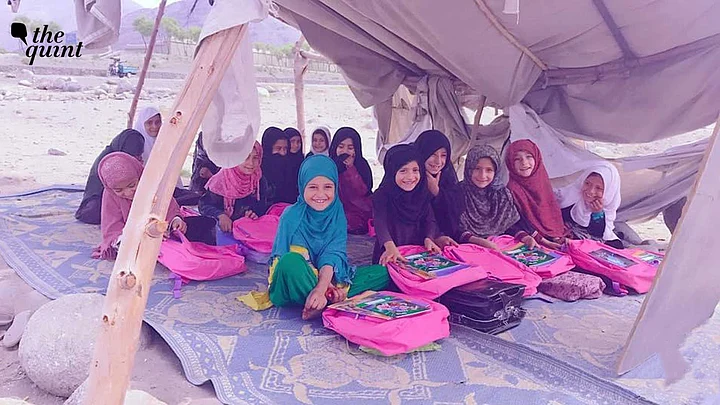(Girls' education activist Matiullah Wesa was arrested by the Taliban on the evening of Monday, 27 March. The Quint had interviewed Wesa in August 2022 about his efforts to promote girls' education in rural Afghanistan. This story has been republished from the archives as demands to #ReleaseMatiullahWesa overtake the internet.)
Huddled under a small tent with large grins spread across their faces, a group of girls in Kandahar, Afghanistan, smiles at the camera, holding on to their books and pink bags as if nothing else mattered.
"The Taliban took charge of Afghanistan on 15 August 2021. The campaign to promote girls' education in the country began on 17 August. Education is a basic right. It is a human right. The Afghan people want that," Matiullah Wesa, president and co-founder of PenPath, a volunteer organisation that promotes girls' education in rural Afghanistan, tells The Quint in a phone interview.
The last time the Taliban had proper administrative control of the country was between 1995 and 2001, a period during which women's rights were brutally snatched away. This time, they promised that it would be different.
In less than a year, however, "the Taliban have decimated the rights of women and girls in Afghanistan. They have violated women's and girls' rights to education, work and free movement," according to an Amnesty report from 27 July 2022.
Within the current situation, girls are currently not allowed to attend secondary school. The Ministry of Education had given a ray of hope when it announced on 21 March 2022 that both boys and girls would return to school for the spring. On 23 March, however, the Taliban announced that girls' secondary schools would remain closed due to what it called "technical" issues.
The move is estimated to affect 1.1 million girls across the country, "increasing the risk of exploitation and abuse, including child marriage," according to the United Nations report from June.
Not all, however, are willing to just let the Taliban walk over their right to education. Ever since the new regime was established, activists and campaigners have defied the rules and taken the matter of education into their hands. This is the story of one such activist, Matiullah Wesa, and the 'secret schools' that his organisation, PenPath, has established over the past year.
Afghanistan's 'Secret Schools'
Whether it is on a quiet street, or a local madrasa, or a hatched tent in a remote village, men and women are running 'secret schools' to bypass the rules that prevent girls in the country from attaining their education.
"Now, we are operating 39 underground schools, where more than 120 teachers teach more than 5,000 girls from grade 1 to grade 9," Wesa tells The Quint.
"There are also six online schools," he proudly adds, even mentioning that his campaign includes foreign teachers who teach various subjects using a zoom link. His organisation, however, does need more resources to extend the opportunity to girls who belong to grades 10, 11, and 12.
"The location of the 'secret school' varies. Sometimes we have classes in the open. In some cases, they are inside a madrasa, and sometimes we teach girls inside their homes. A kind of private tutoring," Wesa says.
It's not an easy task. Even though West has been publicly campaigning to win the support from families and local tribal leaders for his organisation's schools, he admits that it is hard to convince the rural Pashtun population the importance of education.
"Their lack of education doesn't make them realise the importance of education and how it can lead to a good career and a stable life."
'Mobile Schools'
One of Wesa's proudest achievements in his campaign is what he calls 'mobile schools.' The organisation launched solar-powered schools, which are attached to motorbikes, to help girls in remote areas have access to education.
These bikes move from village to village and provide online lessons from female teachers using tools like the internet and a projector screen. Wesa calls it "the first Afghanistan-developed innovation of its kind."
The response to the 'mobile schools' has been encouraging, says Wesa. In villages where there has been not a single school ever, where people live in abject poverty, students are flocking to the bikes to learn.
The Obstacles
With respect to education, Afghanistan is a country with many problems – the security concerns regarding the Taliban, poverty, and conservative traditions to name a few.
"We have had to deal with threats and harassment from Taliban officials," Wesa acknowledges. He has been repeatedly detained for his activism and publishing work on the internet. Even his car and house have been targeted. He is, however, not willing to back down. Being in the good books of tribal leaders often helps him in these situations.
Money is obviously a problem. Teachers who have to work in remote areas naturally demand higher wages because of the long distances they must travel and the fear of security concerning the Taliban. But the size of the salaries is usually dependent on how generous the donors are being.
And as mentioned above, many people in rural areas just don't believe that girls' education is worth the trouble and the money. But his influence among religious and tribal groups is allowing his organisation to slowly attract more and more students to the 'secret schools.'
To spread the word about his schools, Matiullah uses social media to his advantage. He is a regular user of Twitter, a platform on which he shares and writes about his work extensively.
